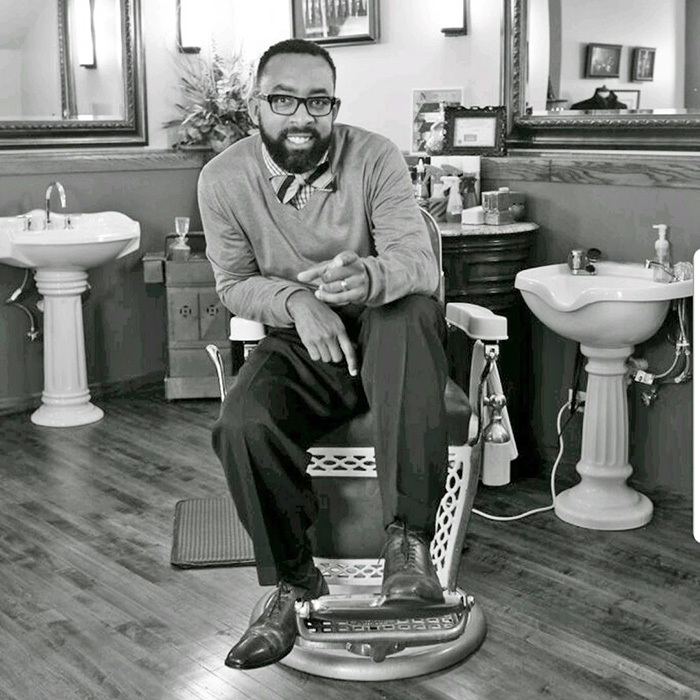Note: This Q&A is part of an occasional series linking today’s local Black-owned businesses to their historical antecedents. The series was started in 2019 by the village of Flossmoor’s Community Relations Committee. This article originally was published by the village and is posted here with permission. History research was done by Rosalind Henderson-Mustafa of Flossmoor.
Mike Miller keeps the community tradition of the barbershop as a center of business, political and social information as well as providing hair care service and products at Yesterday’s Gentlemen Barbershoppe, 1024 Park Drive in Flossmoor.
What inspired you to start your business?
It was something that came naturally to me. I realized in this big world that we live in, that everyone has a gift or several. I loved bringing people together, which in my eyes became family. Another reason why I opened my business was to bring back the true meaning of tonsorial artistry. It has been lost over the years. To bring back that feeling of being proud to be who we are. I wanted to elevate the mentality of owners, as well as clients.
Why did you choose Flossmoor to open your business?
It was the perfect setting for my concept.
As a business owner, what is your proudest civil rights moment or memory?
The moment we came together and realized our worth and power in this country through the power of numbers.
What has history taught you that could help someone else who is interested in starting a business?
I look at the means which we have now to be successful; the path that has been set through these that came before us. And I look at the power that our people had in the past; they stuck together and supported one another.
As it relates to your business, what is your favorite quote or saying?
The great A.G. Gaston, [wealthy businessman and civil rights activist] said: “See a need and fill it.” He meant that when you create something, people will come.
As it relates to Black History Month, what is your favorite quote, moment or memory?
If you don’t know where you came from, you don’t know where you’re going.
Leonard Bailey, an inventor and businessman, rose above poverty by becoming a journeyman barber and later owner of many barbershops in Washington, D.C.
Bailey was born in 1825 to free black parents. In 1869, he served on the first integrated jury in the capital.
Bailey’s inventions and business accomplishments demonstrated his support for people of lesser means. He helped establish the Capitol Savings Bank in 1888 to provide affordable loans and insurance, serving as bank president before becoming head treasurer and a director of its finance board. Capitol Savings became a trusted bank for Blacks and whites.
Bailey’s inventions include patents for a truss-and-bandage for patients with lower-body hernias and a folding bed for easy storage. Both were adopted by the U.S. Army. He also invented a device for moving railway trains and a speed stamper for mail used by the U.S. Postal Service.
James P. Thomas, born in Tennessee in 1827, was a barber and businessman who became one of the richest men in Missouri. His father was John Catron (one of the Supreme Court justices in the Dred Scott case, which confirmed that African Americans in the U.S. were not considered citizens) and his mother a slave. Thomas’s mother bought his freedom when he was 6 years old, but the law prevented any formerly enslaved person to remain in the state. Thomas gained his freedom at the age of 24 when he petitioned the court successfully. He was allowed to remain in the state until he relocated to Missouri five years later.
Thomas invested in real estate in St. Louis, built and renovated apartments, and invested in railroad and insurance company stock. At the height of his financial power, James Thomas controlled an estate worth an estimated $250,000 ($4.8 million today). His 1904 autobiography, “From Tennessee Slave to St. Louis Entrepreneur: The Autobiography of James Thomas,” chronicles his real estate and barber career, serving influential politicians and businessmen.
Related story:
Business and fashion success because of doors opened by women like Elizabeth Keckley (Oct. 24, 2019)




